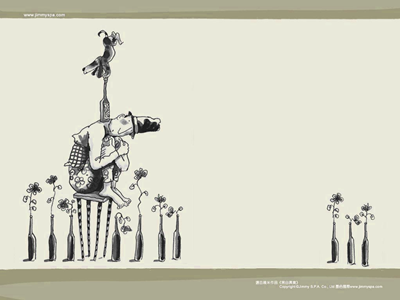
Her cheer, her optimism—they in no way match this stinky, slow, sinking, mysterious, silent, weird city. Venice seems like a wonderful city in which to die a slow and alcoholic death, or to lose a loved one, or to lose the murder weapon with which the loved one was lost in the first place. Seeing Venice, I'm grateful that I chose to live in Rome instead. I don't think I would have gotten off the antidepressants quite so quick here. Venice is beautiful, but like a Bergman movie is beautiful; you can admire it, but you don't really want to live in it.
The whole town is peeling and fading like those suites of rooms that once-rich families will barricade away in the backs of their mansions when it gets too expensive to keep the maintenance up and it's easier to just nail the doors shut and forget about the dying treasures on the other side—this is Venice. Greasy streams of Adriatic backwash nudge up against the long-suffering foundations of these buildings, testing the endurance of this fourteenth-century science fair experiment—Hey, what if we built a city that sits in water all the time?
Venice is spooky under its grainy November skies. The city creaks and sways like a fishing pier. Despite Linda's initial confidence that we can govern this town, we get lost every day, and most especially at night, taking wrong turns toward dark corners that dead-end dangerously and directly into canal water. One foggy night, we pass an old building that seems to actually be groaning in pain. "Not to worry," chirps Linda. "That's just Satan's hungry maw." I teach her my favorite Italian word—attraversiamo ("let's cross over")—and we backtrack nervously out of there.
The beautiful young Venetian woman who owns the restaurant near where we are staying is miserable with her fate. She hates Venice. She swears that everyone who lives in Venice regards it as a tomb. She'd fallen in love once with a Sardinian artist, who'd promised her another world of light and sun, but had left her, instead, with three children and no choice but to return to Venice and run the family restaurant. She is my age but looks even older than I do, and I can't imagine the kind of man who could do that to a woman so attractive. ("He was powerful," she says, "and I died of love in his shadow.") Venice is conservative. The woman has had some affairs here, maybe even with some married men, but it always ends in sorrow. The neighbors talk about her. People stop speaking when she walks into the room. Her mother begs her to wear a wedding ring just for appearances—saying, Darling, this is not Rome, where you can live as scandalously as you like. Every morning when Linda and I come for breakfast and ask our sorrowful young/old Venetian proprietress about the weather report for the day, she cocks the fingers of her right hand like a gun, puts it to her temple, and says, "More rain."
Yet I don't get depressed here. I can cope with, and even somehow enjoy, the sinking melancholy of Venice, just for a few days. Somewhere in me I am able to recognize that this is not my melancholy; this is the city's own indigenous melancholy, and I am healthy enough these days to be able to feel the difference between me and it. This is a sign, I cannot help but think, of healing, of the coagulation of my self. There were a few years there, lost in borderless despair, when I used to experience all the world's sadness as my own. Everything sad leaked through me and left damp traces behind.
Anyhow, it's hard to be depressed with Linda babbling beside me, trying to get me to buy a giant purple fur hat, and asking of the lousy dinner we ate one night, "Are these called Mrs.Paul's Veal Sticks?" She is a firefly, this Linda. In Venice in the Middle Ages there was once a profession for a man called a codega—a fellow you hired to walk in front of you at night with a lit lantern, showing you the way, scaring off thieves and demons, bringing you confidence and protection through the dark streets. This is Linda—my temporary, special-order, travel-sized Venetian codega.
Eat, Pray, Love












